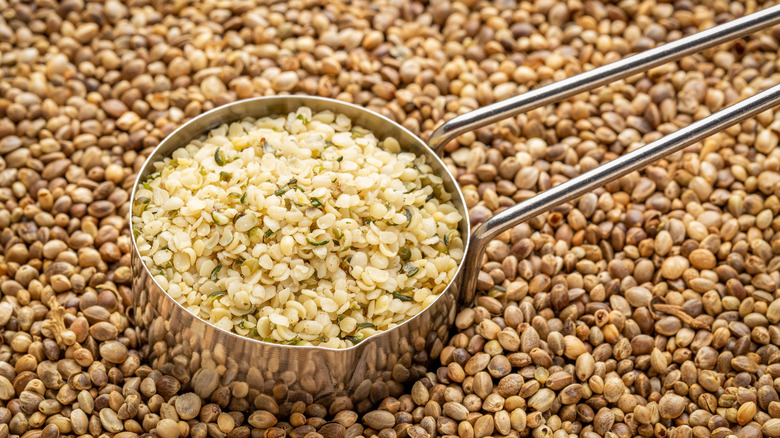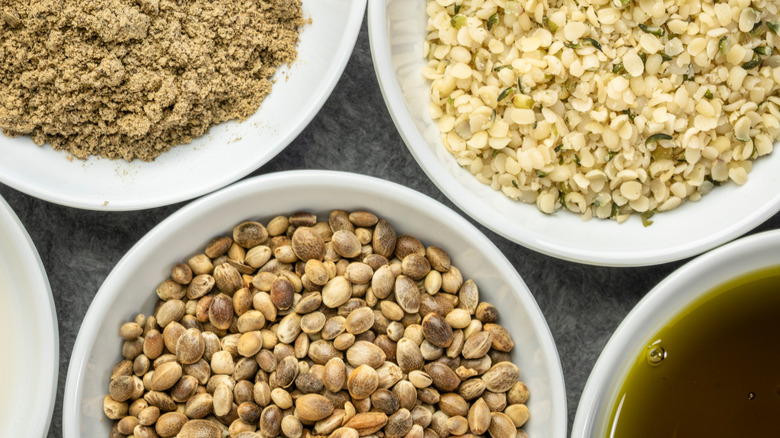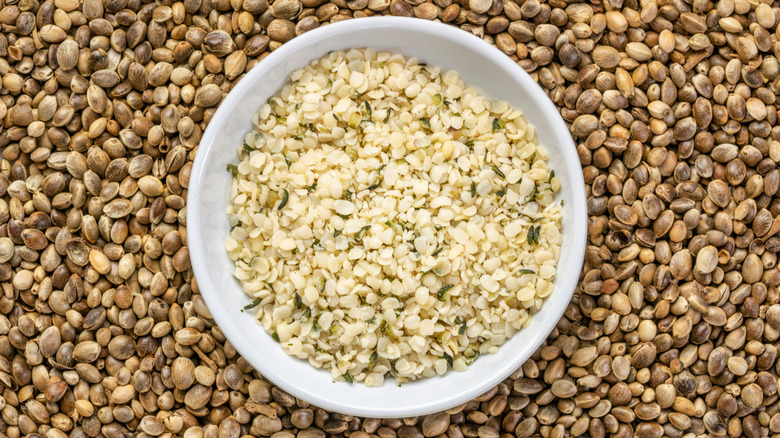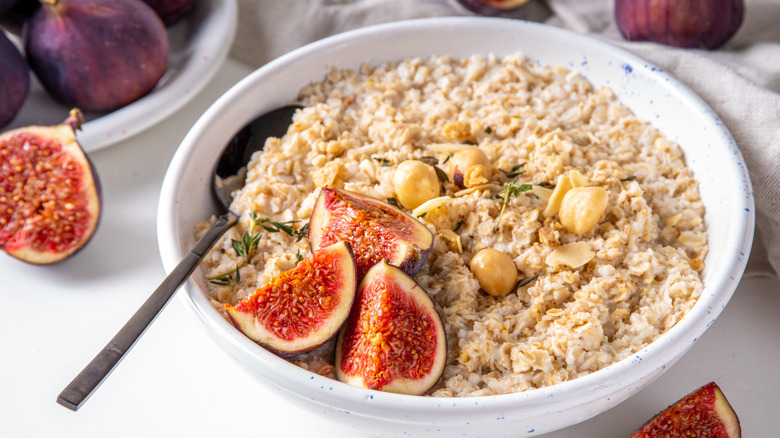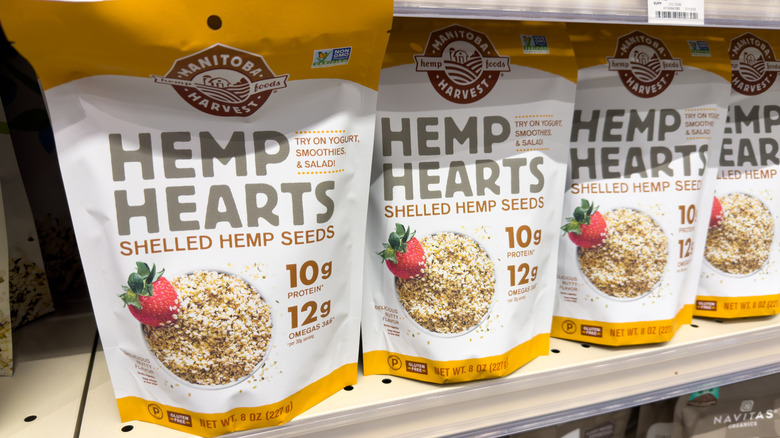Hemp Hearts Are A Game Changer For High Protein Breakfasts
We may receive a commission on purchases made from links.
Getting a quick and easy high protein breakfast is an endless challenge. Sure, a big pile of breakfast meats might do the job, but that's a relatively high cost. Plus, it takes time to make and it results in a mess to clear up. If you're vegetarian, that's not even an option, and you usually have to turn to eggs for a good breakfast protein. If you're vegan, or just looking for a simple solution for something to jumpstart your day, choices can feel limited.
However, the arrival of hemp hearts to the United States is a real game changer. Not only are hemp hearts vegan, but they also provide a high protein solution that couldn't be quicker or easier to revitalize your breakfast game. One serving (around 3 tablespoons of hemp hearts) includes nearly 10 grams of protein, more than one and a half times what you'll find in eggs. Hemp hearts can be added to whatever breakfast that you like, and studies suggest that they have a wealth of health benefits besides just being a great source of protein.
What are hemp hearts, and do they get you high?
It's important right off to make it clear: Hemp hearts will not make you high, give you the munchies, or anything in between. Hemp hearts are shelled hemp seeds from the cannabis sativa plant. However, while the genus and species are the same, they come from a different variety of the plant to the one that people consume for its other properties. The hemp seeds and hearts that you can buy in the store naturally don't contain any THC or CBD, the active ingredients that produce marijuana's effect. The United States Food and Drug Administration (FDA) has marked hemp seeds as "Generally Recognized as Safe," noting that they "contain only trace amounts of THC and CBD, which the seeds may pick up during harvesting and processing when they are in contact with other parts of the plant. Consumption of these hemp seed-derived ingredients is not capable of making consumers 'high.'"
The association between hemp hearts and marijuana is a large part of why they're new to the United States markets. Industrial hemp use was on the rise in the early 1900s, with hemp being used to craft a range of materials while the seeds were added to animal feed. However, the Marijuana Tax Act of 1937 restricted the production of hemp, forcing all hemp growers to be registered and licensed, lumping the industrial production in with growth of the plant used for marijuana. It was not until 2018 that the use of hemp in agriculture was made legal again, and hemp seeds were able to be produced and imported again starting in 2019. While it might feel like a new food to people in the United States today, hemp seeds have been eaten in China for thousands of years and as far back as the 16th century in Europe.
The health benefits of hemp hearts and seeds
The exact health benefits of hemp hearts and seeds are continuing to be studied, and the connections between the beneficial nutrients and health effects might vary from person to person. That being said, studies have shown that there are lots of positive effects that can come from introducing hemp hearts to your diet. The most concrete of these simply comes down to its high protein content. Adding hemp hearts to your breakfast can keep your hunger in check throughout the day and ensure that your body has all it needs to repair itself and build muscle. Crucially, hemp hearts are a complete protein, meaning that they contain all nine of the essential amino acids that aren't produced by our bodies, and any meal you add them to will become a great protein source.
Additionally, hemp hearts are a great source of antioxidants and a balanced source of omega-3 and omega-6 fatty acids. These have been seen to help fight skin disorders, reduce hair loss, lower blood pressure, and more. The presence of gamma-linolenic acid has also been shown to tackle the effects of premenstrual syndrome and menopause issues, such as breast tenderness, by reducing the impact of prolactin.
The unshelled hemp hearts that are sold as hemp seeds have all the same properties as their shelled counterparts. The only notable difference is that they have an increased amount of fiber from the shell, around 1 gram of soluble and insoluble fiber per 30 gram serving. According to the Mayo Clinic, the extra fiber can help to promote bowel health and digestion, can help control blood sugar levels in people with diabetes, and can help to reduce cholesterol intake, potentially improving heart health.
How to start eating hemp hearts and what to do with them
Before you start sprinkling hemp seeds over everything you eat, there are a couple of things to check. Some studies suggest that hemp seeds can interfere with some medications, such as blood thinners and medicine for atrial fibrillation, as well as exacerbating the effects of diuretics. If you take any of these medications, it is best to check with your doctor before trying hemp hearts. Additionally, especially with the high fiber content, it is better to try a small amount before adding a full serving to multiple meals. While hemp hearts are part of the hemp seed, they're technically nuts. It is possible to be allergic to hemp seeds, but it does not seem to have a straight correlation with other tree nut allergies, so once again, it is better to try a small amount first.
Once you're sure that hemp hearts are right for you, actually adding them to meals is extremely simple! Hemp hearts, or seeds if you're looking for more fiber and a bit of crunch, can be mixed into your favorite yogurt, oatmeal, or smoothie, or just scattered over the top. But you can also cook with hemp hearts. You can add hemp hearts to baked goods, add them to soups, or (if you're feeling adventurous) even make hemp heart milk at home.
Where to buy hemp hearts and seeds
You might not have heard of hemp hearts before, but they're not too hard to find these days. Not that long ago, you would have needed a specialty store or a grocery chain like Whole Foods, but now you can find them most places, including Costco, Walmart, and Amazon, which all stock Manitoba Harvest brand hemp hearts. If you're looking for hemp hearts in a physical grocery store, you should be able to find them near the grains, oats, and nuts.
Once you've purchased your hemp hearts, you have a while to use them, but it's important to store them properly. Keep them sealed in a cool, dry, dark place and they should keep for at least six months, or up to a year in the fridge. They'll start to lose their nutty taste and take on bitter notes if they have gone bad and rancid from the oil in the seeds. So, while you can buy a five pound bag of hemp hearts on Amazon, it might be best to start off small.
